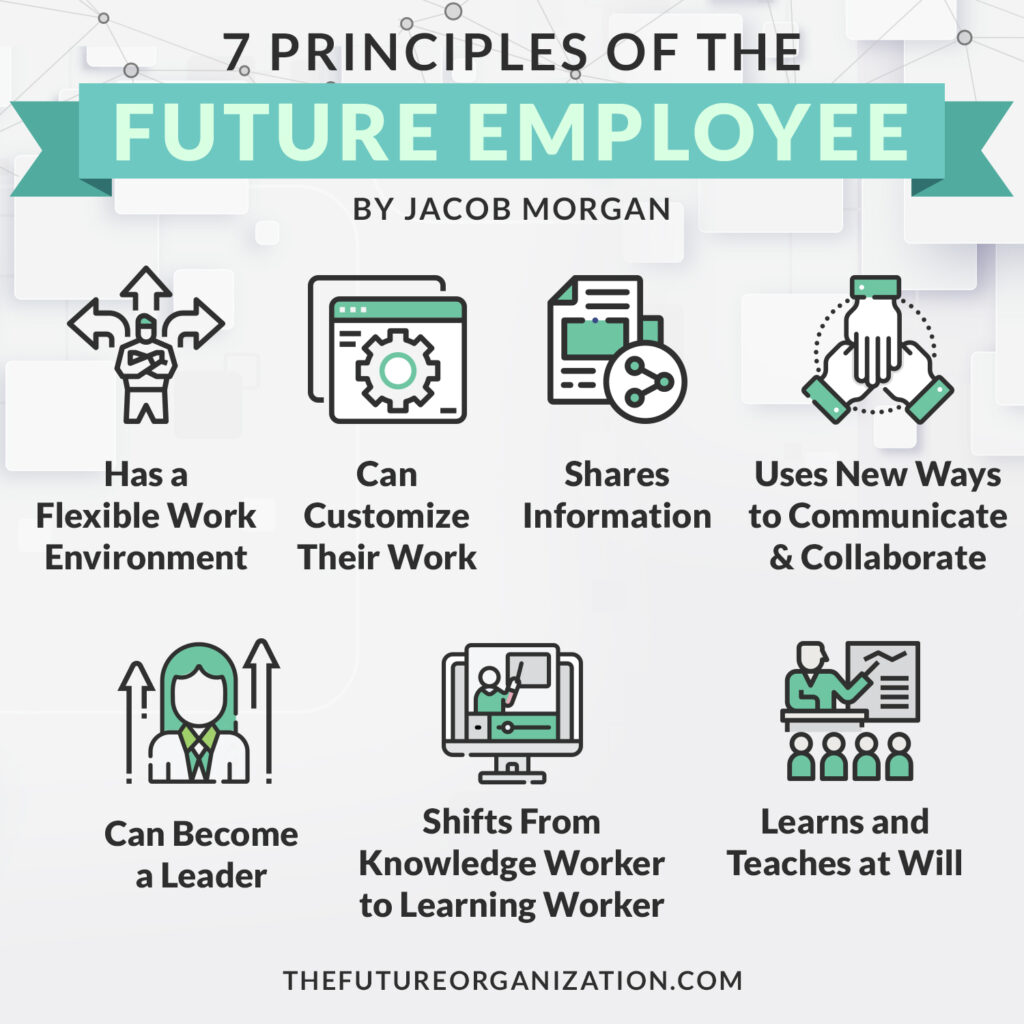Employees today are dramatically different than they were even a decade ago.
Think of how employees have had to adapt and change in the last year—employees in 2021 are different than they were at the beginning of 2020.
The world of work is constantly changing. Skills and mindsets that were long considered to be in the future are gaining steam now. To stay relevant, employees and organizations need to be aware of what to expect from future employees. And the future is now.
These seven principles of future employees are becoming true today, especially after the transformative year of 2020. These are the skills future employees need to embrace and the things companies need to consider to hire and retain the best talent.
The future employee needs to cover these seven principles:
1. Has a flexible work environment.
Employees of the future won’t be bound to a desk or cubicle and will instead have the freedom to work when and where they want. We’ve seen countless companies shift to remote and flexible work during the pandemic, and many employees won’t want to go back to work in an office.
2. Can customize their own work.
Future employees won’t follow the typical career path of climbing the corporate ladder. There isn’t a one-size-fits-all approach to guaranteed career success. Instead, future employees will be able to shape their career paths and choose their next projects and positions.
3. Shares information.
Gone are the days of hoarding information to seem smart. Future employees share ideas and information and freely collaborate with their colleagues. The people who share information will become the next generation of leaders.
15 Top CEOs Share Their Best Leadership Lessons
Learn from the CEOs of Netflix, Honeywell, Volvo, Best Buy, The Home Depot, and others.
Get the PDF→
4. Uses new ways to communicate and collaborate.
Instead of only relying on emails and phone calls, future employees will embrace new technology to communicate and collaborate in the most efficient ways possible.
5. Can become a leader.
Future leaders have the unique opportunity to become leaders within their organizations by sharing their ideas and feedback in public ways with their peers and managers. Employees can build their own networks and get recognized for their contributions. There is no longer one path to becoming a leader - anyone can do it with the right skillset and network.
6. Shifts from knowledge worker to learning worker.
The most important skill for future employees is to know how to learn. The ability to learn new things and apply them to new situations will be crucial to success. Instead of relying on what they learned in school, future employees will always be learning.
7. Learns and teaches at will.
Employees no longer have to participate in formal training programs to learn. They can share information and best practices within their organizations through mentoring programs, internal collaboration tools, and face to face interactions. Future employees are eager to share and teach others, and they also ask questions and learn from the people around them.
We’re well on our way to the future of work, and how employees work, learn, and grow will never be the same. To succeed in the future of work - now and throughout their careers - employees need to embrace these seven principles.
For more information on these principles, check out the graphic below:

_______________________________________________________________________________
If you enjoyed the article and want more content like this here’s what you can do:
- Subscribe to The Future of Work Podcast where I interview business leaders around the world each week.
- Grab a copy of The Future Leader which has been endorsed by the CEOs of MasterCard, Best Buy, Oracle, Audi, Unilever, Domino’s Pizza, Ritz Carlton, Kaiser, and Marshall Goldsmith. It explores the most essential skills and mindsets for future leaders.
- If you are or want to be an entrepreneur then my wife and I just launched a brand new podcast on how to Be Your Own Boss, called the BYOB Podcast where we share what we did and how we did it. You can subscribe to that here.
Comments